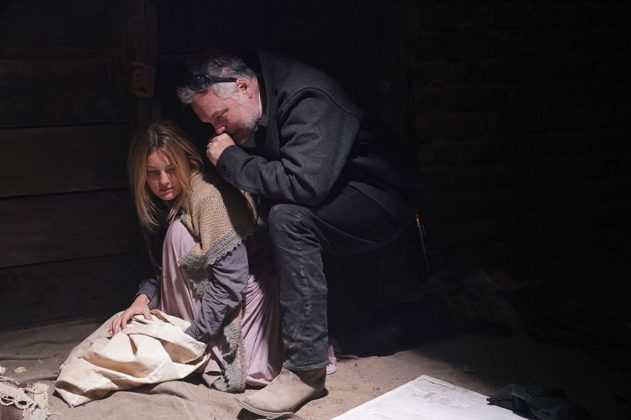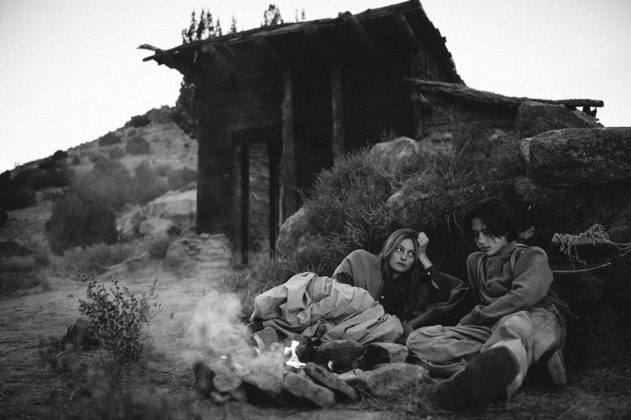MY DIRTY LITTLE SECRET: I LOVE WESTERNS (BUT “THE KID” MISSES THE MARK)
I must divulge two important facts. The first one is that the Western is my favorite film genre, and the second, my favorite Western (and third favorite film ever made) is Sam Peckinpah’s “Pat Garrett and Billy the Kid,” starring James Coburn and Kris Kristofferson (1973). I am of the opinion that Peckinpah’s work on that film is profound and special, and impossible to match. To this, I admit that any film based on the story and legend of Billy the Kid will suffer from comparison.
Stan Dragoti’s 1971 “Dirty Little Billy” was a gritty and uniquely-unsentimental take on the legend and 1989’s “Gore Vidal’s Billy the Kid” benefited from an extremely smart script and a fantastic performance from Val Kilmer.
2019 gives us Vincent D’Onofrio’s second feature film as director, “The Kid,” a much too simplistic take on the oft-told story that might have won us over with its sincerity to be a fun throwback but that makes the fatal mistake of inserting two fictional characters (fifteen year-old Rio and his older sister Sara) who just happen to be around when the major events of Garrett and Billy’s lives occur.
After killing their father for beating their mother near to death, the siblings go on the run from their vengeful uncle (Chris Pratt in full beard and fake teeth) and stumble across Billy the Kid and Pat Garrett, right as Billy is first captured and taken back to the town of Lincoln to hang.
[Did you know? Leila George, who plays Sara Cutler in “The Kid,” is Vincent D’Onofrio’s real-life daughter]
For the obvious reasons, young Rio sees a kinship in Billy (Dane DeHaan, trying much too hard to make something of his obvious dialogue) yet is also drawn to the nonchalant confidence and determination of Pat Garrett (an excellent Ethan Hawke who continues to prove why he belongs in Westerns).
The ensuing fusion of historical and fictional characters becomes more preposterous as the film continues. Rio is constantly there at important moments through contrived circumstances and we see these historical events through his eyes. While I am sure D’Onofrio and co-screenwriter Andrew Lanham wanted this to be a different perspective, it proves to be the anvil that ultimately sinks the film.
It is redundant (and truly silly) to have this doe-eyed young boy at every important moment in the saga of Billy the Kid and Pat Garrett. It simply doesn’t work and takes the viewer out of the drama when we should be riveted by it.
As director, Vincent D’Onofrio doesn’t give his scenes nor his actors time to breathe, as he hurries through many important moments just as they should become dramatically gripping and completely throws the pacing of his film out of whack.
And by the time Garrett and Rio go on a mission to rescue his sister (don’t ask!) it all becomes too much and goes against everything we know about the history of Pat Garrett.
“The Kid” does hold an interesting parallel between Billy and Garrett that hadn’t previously been explored. In two separate scenes, Rio is told by each one of them of the first time they had to kill a man, and why. This is an inventive device that gives us a look inside the events that started these two men on the road to their fate. Unfortunately, these scenes are the only genuine moments in a film that tries for profundity but falls much too short.
Cinematographer Matthew J. Lloyd bathes the film in a serviceable atmosphere but is never as gritty as what this story calls for. The score from brothers Latham and Shelby Gaines, who create music from found materials, is actually quite good and enhances the Western feel even though the director let the mood slip away from him.
I was looking forward to “The Kid,” as I respect Vincent D’Onofrio and consider Ethan Hawke to be a versatile talent, and, lest we forget, I’m always ready for a good Western. Alas, this is a film that wants to be too many things and one that ultimately gets lost in its own narrative. Whatever story to tell, or how to tell it, was ostensibly being left to chance.
news via inbox
Nulla turp dis cursus. Integer liberos euismod pretium faucibua




